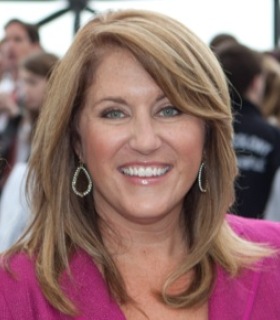
Elizabeth Redenbaugh
Winner of a 2011 Profile in Courage Award from the John. F. Kennedy Presidential Library, Elizabeth Redenbaugh’s journey to the podium began with a rumor and a sermon. In 2007, the Junior League of Wilmington, North Carolina Sustaining member and ardent integrationist was tipped off by a fellow parent at her children’s school that a movement was afoot to re-draw the boundary lines between the neighborhoods of New Hanover County, in effect re-segregating the integrated school district, an area of roughly 200 square miles that has historically been divided along racial and socio-economic lines.
Shortly before her conversation with the fellow parent had taken place, Redenbaugh had been moved by a series of sermons by Pastor Mark Driscoll of the Mars Hill Church in Seattle who said that all individuals are worthy of dignity and value and respect.
“I had to figure out how to order my life to reflect that,” she said.
The desire to re-order her life led Redenbaugh, an attorney, to run for a slot on the school board where she would have a platform from which to argue her case.
“Only one percent of schools in high poverty areas are high performers,” she said. “Low poverty schools are 22 times more likely to be high performing than high poverty schools, which have a significant drop-out rate.”
She won the election, but failed to succeed in defeating the re-districting movement, and later that year, children were ordered to return to their neighborhood schools.
“I can’t thank The Junior League enough and I genuinely mean that,” she said. “I was not aware of the plight of poor minority kids in our community but I learned about it through my experience in the League. Some of these kids get their only hot meal for the day when they come to school. They may not eat over the weekend.”
Along the way, the rebuttals to her position became so intense that she wound up writing an email to a parent who supported the re-segregation despite the fact that Redenbaugh had spent a substantial amount of time talking through the issue with her and feeling that perhaps she had gained some favorable ground. Ultimately, after re-sending the email to fellow diversity advocates, the email was published as an editorial in the paper.
“I put it all out there; it was blunt and honest and it sparked the community’s fury,” she said.
“The hardest part of the struggle was after the email I wrote was published. I had four re-districting meetings and then board meetings where I saw the parents of the kids my kids play with and I had to watch person after person yell and scream at me,” she said. “I remember thinking to myself I should be in tears running from the room.”
But Redenbaugh didn’t run.
“They yelled every name in the book at me. [Standing up to that] was the part that took the most courage.”
Although her effort to fight re-districting has not yet prevailed, Redenbaugh vows to keep on fighting.
